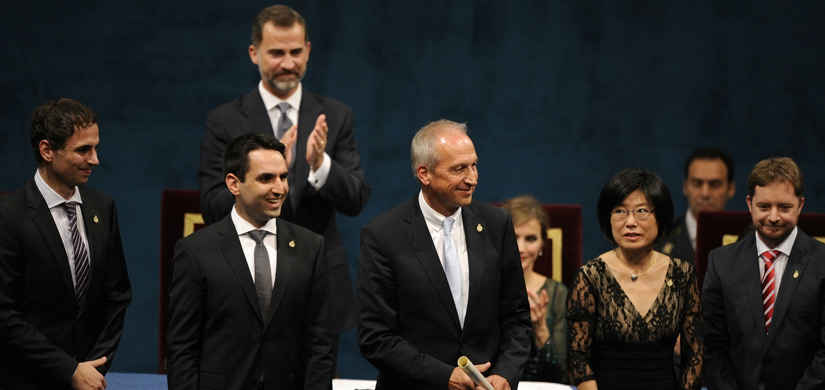The Princess of Asturias Foundation
Sección de idiomas
Fin de la sección de idiomas
Sección de utilidades
Fin de la sección de utilidades
- The Foundation
- HM The King
- HRH The Princess of Asturias
- 2023 Special
- Princess of Asturias Awards
- Area of Communication and Media
- Music Department
- Exemplary Town of Asturias Award
- 2012 Special
- 2013 Special
- 2014 Special
- 2015 Special
- 2016 Special
- 2017 Special
- 2018 Special
- 2019 Special
- 2020 Special
- 2021 Special
- 2022 Special
-
Important: COVID-19
-
Terms of Use
You are in:
- Area of Communication and Media |
- Other News
Start of main content
Princess of Asturias Awards 03/19/2013
The Max Planck Society is to fund a grants programme for young Spanish researchers, after receiving the 2013 Prince of Asturias Award for International Cooperation
PhD and postdoctoral students will be able to undertake a research residency at the Max Planck Institute in Germany.

Representatives of the Max Planck Society for the Advancement of the Science. ©FPA
The Max Planck Society will match, from its own resources, the cash prize for the Prince of Asturias Award which it received in 2013 to fund a grants programme entitled the "Max Planck Prince of Asturias Award Mobility Programme" aimed at enabling young Spanish researchers to further their research at a Max Planck Institute in Germany.
The students will be able to undertake a research residency for a period of four weeks per year for PhD students and up to eight weeks per year for postdoctoral students. They will also have the chance to participate in one or other of the ongoing projects at the Max Planck institutes. Applicants should have a proven scientific record and be no older than 30 and 35 years of age for the respective categories. The application deadline is 31st May.
The Max Planck Society currently supports over 5,000 collaborative projects -two hundred in Spain- with nearly 6,000 partners in more than 100 countries. Spanish scientist Juan Ignacio Cirac, 2006 Prince of Asturias Award for Technical and Scientific Research, heads the Theory Division at the Max Planck Institute of Quantum Optics.
Max Planck Society for the Advancement of Science.
The Max Planck Society for the Advancement of Science (Max-Planck-Gesellschaft zur Förderung der Wissenschaften, in German) is a network of scientific research institutes founded in Göttingen (Germany) in 1948, as successor to the Kaiser Wilhelm Society for the Advancement of Science, which had begun its work in 1911. Named in honour of the German scientist who initiated quantum mechanics, it has its current headquarters in Munich. It encompasses 80 institutes in all, five of them abroad: Bibliotheca Hertziana (Rome), The Art History Institute (Florence), The Max Planck Institute for Psycholinguistics (Nijmegen, Netherlands), Max Planck Florida Institute (USA) and Max Planck Institute Luxembourg for International European and Regulatory Procedural Law (Luxemburg). It also has around 30 Max Planck Research Schools for PhD students (86.4% of whom are foreign nationals) and over 40 integrated research groups at universities and foundations worldwide. The Society employs more than 17,000 people: 5,300 are scientists, 36.9% of whom are foreign nationals, as are 31.5% of those occupying positions of responsibility. Moreover, over 4,000 junior and guest researchers from all around the world work at its institutes, bringing the number of people employed by the Society to more than 21,500. The president of the Max Planck Society is cell biologist Peter Gruss.
Further information
End of main content
Sección de utilidades
Fin de la sección de utilidades
- Legal document Legal document (Access key 8)
- | Privacy policy Privacy policy (Access key )
- | Social networks ???en.portal.pie.menu107.title???
- | Cookies ???en.portal.pie.menu110.title???
- | Site map Site Map (Access key 3)
- | Contact Contact (Access key )
- | XHTML 1.0
- | CSS 2.1
- | WAI 'AA
© Copyright 2024. FUNDACIÓN PRINCESA DE ASTURIAS





